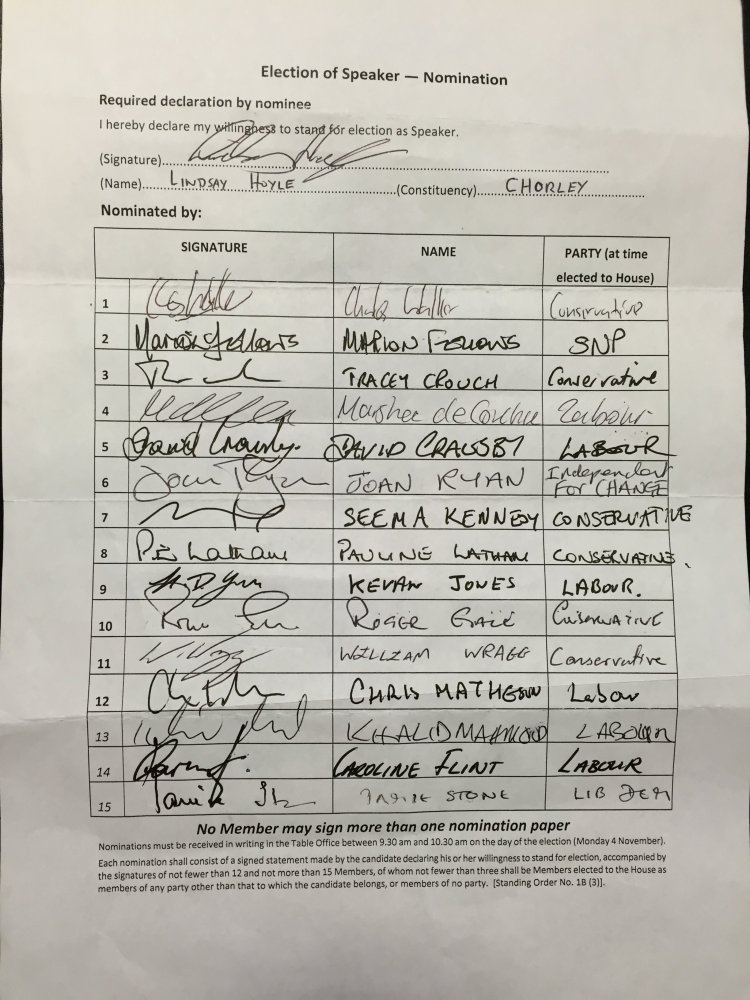Following the often delayed departure of the previous Mr. Speaker John Bercow, this week sees the election of the next speaker of the House of Commons.
How does one become a Speaker? Firstly one has to already be a sitting Member of Parliament. Their electorate is what has been described as “the most duplicitous electorate in the world”, namely other MPs. Candidates need the support of at least 12 MPs, three of whom have to be from a different party, in order to be eligible to take part.

The shortlist for the next speaker at the time of writing (Monday lunchtime) is as follows:
- Chris Bryant – former minister and shadow Commons leader; Labour MP for Rhondda since 2001
- Harriet Harman – former minister and deputy Labour leader; Labour MP since 1982, for Peckham and its successor constituency Camberwell
- Meg Hillier – chairwoman of the Public Accounts Committee and former minister; Labour MP for Hackney South and Shoreditch since 2005
- Sir Lindsay Hoyle – elected Labour MP for Chorley in 1997; elected deputy Speaker in 2010
- Dame Eleanor Laing – elected Conservative MP for Epping Forest in 1997; elected deputy Speaker in 2013
- Sir Edward Leigh – Conservative MP for Gainsborough since 1983; former chairman of the Public Accounts Committee
- Dame Rosie Winterton – elected Labour MP for Doncaster Central in 1997; former Labour chief whip; elected deputy Speaker in 2017
The candidates all have an opportunity to speak to the Commons to put forward their ideas on how they would act as Speaker following which the MPs have 20 minutes to vote in a secret ballot. It will take about 45 minutes to count them.
If no candidate receives more half of the votes, the individual who receives the least votes will drop out, as will anyone who obtains less than 5% of the total cast.
After each round, there will be a 10-minute period for candidates to withdraw.
MPs will then continue to vote until one candidate obtains more than half of the votes. The process is being overseen by Ken Clarke, who as Father of the House is the long-serving MP in the Commons.
The role of the Speaker has come under increasing scrutiny over the past few years – and Mr Bercow has been both praised for boosting the influence of backbench MPs and criticised for stretching parliamentary rules.
Some have also accused him of not being impartial when it comes to Brexit.
The Speaker is responsible for choosing which amendments can be voted on – a power that has proved particularly significant in the Brexit process.
He is also in charge of upholding parliamentary rules, and Mr Bercow twice angered some MPs by refusing to allow the government to hold another vote on an already rejected Brexit deal.
The Speaker can also permit MPs to ask urgent questions whereby government ministers are summoned to the House of Commons over a time-sensitive or important matter.
During his years in the role, Mr Bercow dramatically increased the number of urgent questions asked and was seen by many to have broken the centuries old tradition of impartiality, something which the various successors of all parties have said is supremely important and must be adhered to in the future.
The title of Speaker dates back to 1377, and Sir Thomas Hungerford was the first. Traditionally being the Speaker of the House of Commons was an extremely dangerous profession that saw many executed or otherwise killed. Standing up for democracy was a dangerous thing to do against a King, even after the Magna Carta with perhaps William Lenthall being the most famous when he defied King Charles I.
Understandably then, many speakers required more than a bit of gentle persuasion for them to accept the honour that they had been selected for and so even today, the successful candidate will be dragged to the Speakers chair!
The modern role of the Speaker being independent from political parties evolved in the 18th and 19th centuries and whilst it is rarely now a life or death position, it remains one of supreme importance as is clear from the last few days.
My choice for the new Speaker would be Sir Lindsay Hoyle who is already a Deputy Speaker and Chairman of the Ways and Means committee; he already gets to sit in the big chair on important occasions such as the Budget and I’ve always been impressed by his more Northern, blunt and no-nonsense approach to dealing with Members of Parliament as can be seen below, very different to John Bercow.
It is very interesting to see what goes on politically in other countries to me! I have never understood how anyone in Parliament can yell or talk at the same time as others and get things done?! Then, someone will stand up and talk a few minutes and then the arguing begins again! Maybe you can explain it to me when we are there! Can regular folks go there and listen in? By the way, I see your guy won!!
LikeLiked by 1 person
Yes, you and go in and watch the debates, I even do tours there some weekends. Every British citizen has the right to go in and see their elected representative and it’s very easy to do. I’m glad that he won. I see every single possible Speaker was badmouthing the previous, biased Speaker which says a lot.
LikeLike